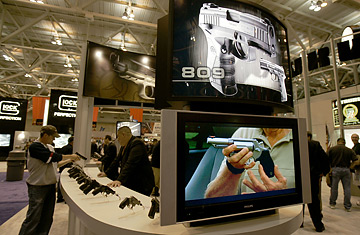
A new revolver called "The Judge" is advertised on a video screen along side other guns manufactured by Taurus during the National Rifle Association convention Friday, April 13, 2007, in St. Louis.
The Bureau of Alcohol, Tobacco and Firearms (ATF) is not meeting its own goal for monitoring licensed firearms dealers. At the current rate of inspections, says an ATF spokeswoman, it would take 17 years to inspect all existing license holders. ATF's stated goal is to complete a routine inspection every three years. "At our current staffing levels we are unable to meet that goal," ATF's chief public affairs officer, Sheree Mixell, told TIME.
Over 100,000 individuals hold a federal firearms license to sell weapons on the open market, and they make over 8 million sales of firearms each year. ATF has some 600 inspectors tasked with making sure license holders keep proper records and perform background checks on purchases in accordance with federal regulations. But these are too few to conduct follow up inspections with any regularity, says ATF. After receiving an initial license, many vendors are never inspected for compliance again. "No matter where you stand on new gun laws," says Congressman Patrick Kennedy, a Democrat from Rhode Island, "the laws currently on the books need to be enforced."
In 2004, a Department of Justice Inspector General report called ATF's inspection program "not fully effective," adding that "inspections are infrequent and of inconsistent quality." In that report, ATF was told to revise its staffing requirement to meet the three-year inspection goal. ATF spokeswoman Mixell says that while the bureau is far from its goal, some improvements have been made to focus the bureau's limited resources over the past three years. For example, says Mixell, ATF now conducts a face-to-face interview with every new applicant for a license. That is not the case for follow-on inspections, however, which are still sometimes conducted over the phone to save time.
All of this fits a pattern of willful neglect, says Paul Helmke, president of the Brady Campaign to Prevent Gun Violence. "Congress has set up an enforcement mechanism," he says, "kept it under-funded, understaffed and restricted in what it can do with the laws and procedures it is supposed to enforce." Giving ATF the resources it needs to enforce existing laws, says Helmke, should be something politicians on both sides of the aisle in Congress can agree on. "We're hopeful," says Helmke, "that post-Virginia Tech this might be an area the elected officials can focus on."
Still, there is no reason to believe that the gun dealers who sold Virginia tech shooter Seung Hui Cho the two handguns he used in the killings were in violation of any existing law. But congressman Mike Castle (R-Del.), a moderate Republican who penned the now-lapsed Assault Weapons Ban, thinks that making sure existing laws are enforced may be the most gun-control advocates can hope for in the current political environment. After the Virginia Tech shootings, even the Democrats that now control Congress didn't seem to have much stomach for a gun-control debate that many think can hurt them in moderate swing states. "Without that initiative," says Castle, who would like to pass legislation closing a loophole that allows weapons to be purchased at gun shows without a background check, "it is almost impossible to get anything done."
